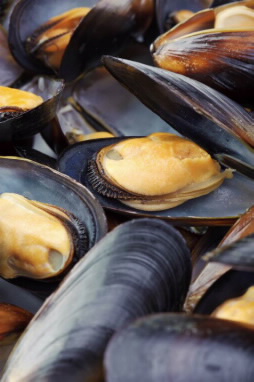FOR IMMEDIATE RELEASE
ACS News Service Weekly PressPac: April 06, 2011
Mussel adhesive inspires tough coating for living cells
“Mussel-Inspired Encapsulation and Functionalization of Individual Yeast Cells”
Journal of the American Chemical Society
Inspired by Mother Nature, scientists are reporting development of a protective coating with the potential to enable living cells to survive in a dormant condition for long periods despite intense heat, dryness and other hostile conditions. In a report in Journal of the American Chemical Society, they liken the coating to the armor that encloses the spores that protect anthrax and certain other bacterial cells, making those microbes difficult to kill.
Insung S. Choi and colleagues say their simple method for coating the yeast cells could “serve as a new strategy for controlling cell division and protection of artificial spore like structures in a designed way.” The technique could be used to encapsulate individual cells for a variety of purposes, including the creation of tiny chemical probes, single-cell chemical factories, and perhaps armor for transplanted cells used in anti-cancer therapies.
The new coating is an organic material called polydopamine, chemically similar to mussel adhesive. In laboratory experiments, the coating slowed down cell division in the yeast, while protecting them from cell-digesting chemicals. “We believe that polydopamine encapsulation would be a good starting point for both fundamental research and applications based on artificial spores,” Choi and colleagues note in their study, “as it endows living cells with durability against harsh environments, controllability in cell cycles, and reactivity for cell-surface modification.”
The authors acknowledge funding from the Korea Research Foundation and the National Research Foundation of Korea.
![]()

the inspiration for development of a tough coating
that could protect living cells from intense heat, dry-
ness, and other harsh conditions.
Contact
Science Inquiries: Michael Woods, Editor, 202-872-6293
General Inquiries: Michael Bernstein, 202-872-6042


